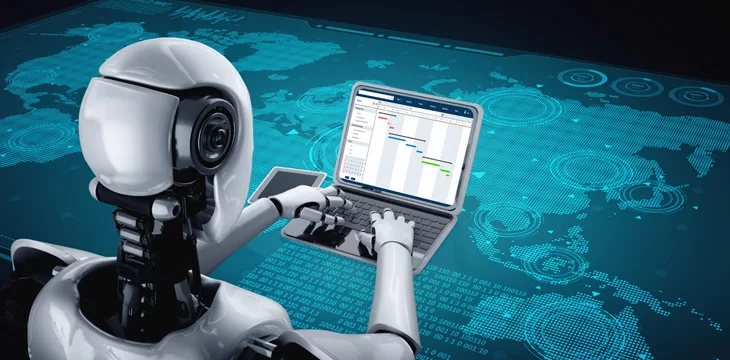|
Getting your Trinity Audio player ready...
|
The artificial intelligence (AI) industry is a fast-moving space. Innovators, governments, and everyone in between currently have their attention fixed on the products and services that AI fuels. In many cases, AI can significantly improve business operations and our quality of life, but no revolutionary technology comes without risks that have the potential to cause harm.
Here are a few significant events that took place in AI last week:
Google contemplates paid AI-powered search features
Google (NASDAQ: GOOGL) is exploring the introduction of paid “premium” features in its search services, powered by artificial intelligence (AI). If Google does decide to go this route, it would mark a significant change in the company’s historical approach of offering free consumer search services financed by advertising revenue—in 2022, Google’s search and related ads generated $175 billion, over half of its total sales.
Google is considering making this strategic adjustment in response to the competitive pressure from OpenAI’s ChatGPT, which since its launch in November 2022, has posed a challenge to Google’s search engine. A significant amount of people use ChatGPT like they do a search engine, asking it questions but getting direct responses to those questions rather than multiple sources that they would need to comb through to find their answer. Because GPT provides these comprehensive and direct answers, it results in fewer people using a search engine like Google, which in turn reduces user interaction with search ads and affects website traffic for online publishers reliant on Google—a net negative for the company.
Although Google says that the company does not have anything to announce at this time, it is rumored that Google’s paid-for, AI-powered search would give its users a similar experience to using ChatGPT for queries.
US, UK create AI safety partnership
The U.S. and the U.K. have announced a partnership focused on enhancing the safety of artificial intelligence. Commerce Secretary Gina Raimondo and British Technology Secretary Michelle Donelan signed a memorandum of understanding to collaborate on advanced AI model testing. This partnership aims to accelerate efforts to mitigate risks related to national security and broader societal concerns associated with AI. Plans include conducting joint testing exercises on publicly accessible AI models and exploring personnel exchanges to foster AI safety.
Recently, these types of government agreements around artificial intelligence, whether they be executive orders or mandates from a single nation or international agreements made by many countries, have increased in frequency. Lawmakers around the globe are trying to signal to the world that the countries or organizations they represent are aware of modern technology and the threats that they present, and that they are subsequently doing all that they can to ensure the evolution of the technology has a positive impact with measures taken to mitigate risk.
But still, just as we mentioned in the last edition of This Week in AI, many of these agreements and partnerships don’t provide any tangible steps that indicate what measures are being taken to actually enforce or ensure the responsible and risk-mitigated use of artificial intelligence systems.
Was Amazon’s checkout-free technology really powered by AI?
It was recently revealed that Amazon’s (NASDAQ: AMZN) innovative checkout-free technology, which it used in its Amazon Go and Amazon Fresh stores, wasn’t an autonomous AI system as many people believed it to be. Rather than relying entirely on Computer Vision, it was revealed that Amazon had employed over 1,000 individuals in India to oversee its network of cameras, verifying customer selections, and manually reviewing transactions to train the AI.
In lieu of the technology, the cashierless system that allowed customers to grab items off the shelf and leave the store without interacting with a point-of-sale system, Amazon says it will be introducing ‘Dash Carts’ that allow customers to scan their products while they shop, for a similar cashierless payment experience.
A closer look at the significant AI events
Although this is only the second “this week in AI” that I have written, I see a bit of a cadence developing that reflects the current state of artificial intelligence in the media; it is dominated by the creation of AI policy, and developments from tech giants.
This week, two events in particular stand out: the first is the fact that Google is considering making an AI-powered search feature a paid-for service. This highlights how generative artificial intelligence systems have significantly changed the way people search for and obtain information. Although it is probably a small number in the grand scheme of things, Google is most likely losing search engine users to AI systems like ChatGPT, that give individuals a direct, and typically accurate, response to the questions they ask it.
The second is the fact that Amazon used so many humans to monitor its cashierless system, an incident like this just goes to show that even in some of the most advanced AI systems, created by some of the world’s largest tech giants, varying amounts of human touch are still necessary at this point in time. Hopefully, that will give those with fears that AI is going to take all of our jobs away a bit of confidence that we are still far away from that future.
In order for artificial intelligence (AI) to work right within the law and thrive in the face of growing challenges, it needs to integrate an enterprise blockchain system that ensures data input quality and ownership—allowing it to keep data safe while also guaranteeing the immutability of data. Check out CoinGeek’s coverage on this emerging tech to learn more why Enterprise blockchain will be the backbone of AI.
Watch: How blockchain will keep AI honest

 02-17-2026
02-17-2026 




